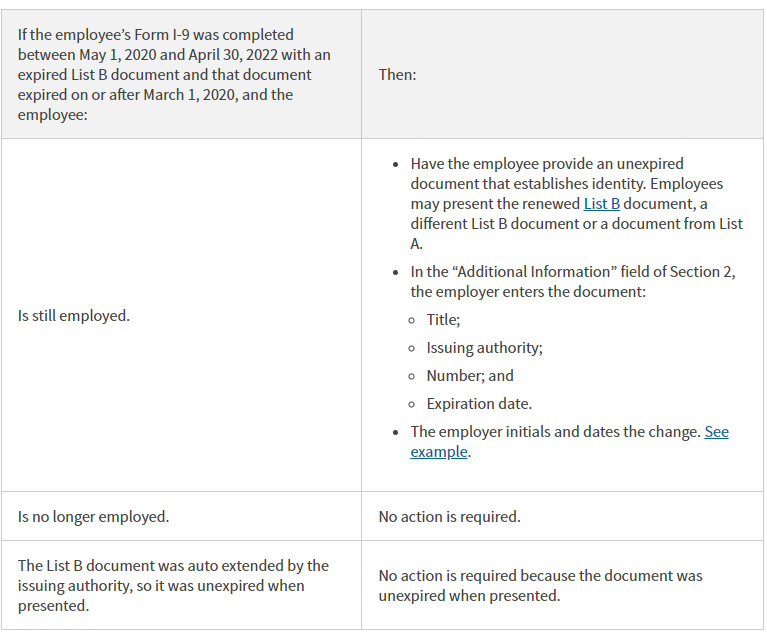Legal Update
Mar 21, 2022
The Beginning of the End: Form I-9 List B COVID-19 Temporary Policy End Announced
The Department of Homeland Security (DHS) has announced that they will soon be ending their COVID-19 related temporary policy allowing employers to accept expired List B documents when verifying an employee’s work eligibility on the Form I-9. Starting on May 1, 2022, employers must return to the pre-COVID norm and only accept unexpired List B documents.
You may recall that the DHS adopted a temporary policy back in 2020 at the onset of COVID-19 which allowed for expired List B documents to be accepted for Form I-9 purposes in response to the many difficulties individuals experienced with renewing identity documents, such as driver’s licenses or state identifications, during the pandemic. Given that most document-issuing authorities have since reopened or provided adequate alternatives to in-person renewals, DHS has decided to end this flexibility.
Seyfarth attorneys had advocated relentlessly for a reconsideration of the cumbersome directive mandating review of unexpired documents at the termination of this policy. Unfortunately the announcement confirms that employers will be required to update Forms I-9 for any employees who presented expired List B documents that were not formally extended by their issuing authority. The recent announcement states, “If an employee presented an expired List B document between May 1, 2020 and April 30, 2022, employers are required to update their Forms I-9 by July 31, 2022.”
This was particularly disappointing given the near impossible task of tracking which states had extended the validity of documents and the shifting time frames for doing so. Employers were further frustrated by the fact that the USCIS provided no assistance in tracking this information, making the requirement to update a certain portion of the Forms I-9 even more nonsensical. An expired List B document verifies the identity of the employee in the I-9 process, and whether or not a state extended the validity of the document has no bearing on its legitimacy.
The USCIS announcement also offers an information chart outlining the specifics of updating these specific Forms I-9. See the table below from USCIS.

Finally, this announcement signals (to us at least) that we are nearing the end of the COVID-19 relaxation of the in-person review policy which means that companies should start to address the population of folks that were virtually completed. We believe the government is aware of the need for a runway at the end of the virtual I-9 policy, and we believe that they will be reasonable. In fact, we are extremely confident that a permanent virtual policy will be introduced by the Department of Homeland Security, but very uncertain if it will remove the requirement for I-9s completed virtually during COVID to be updated with an in-person review.
At a minimum, it is critical that companies begin preparing SOPs to update the temporary List B expired documents. Depending on where you think the government will land on permanent virtual, and more specifically on whether or not COVID virtual I-9s will need to be updated (especially where the I-9 was completed without the identity component - e.g. by email rather than on a video call), you may want to start to update or wean away from virtual for the time being. In this case, companies that still have employees who have not returned to the office, may wish to consider using the Authorized Representative process. Here, a third party completes the I-9 on the company’s behalf. Remember the company is responsible for any violations, so the company should review these I-9s carefully. Either way, getting the jump on this and completing Form I-9 updates as soon as possible may relieve pressure once the other policy ends.
For assistance with updating Form I-9, preparing for a post-COVID I-9 compliance world, or for general questions regarding I-9 compliance, worksite enforcement audits, E-Verify compliance, Department of Labor immigration related wage and hour investigations, general H-1B compliance, and Department of Justice’s Immigrant and Employee Rights section (IER) anti-discrimination matters, please contact the Seyfarth Immigration Enforcement and Compliance group, or the author, Dawn Lurie, directly at dlurie@seyfarth.com.
*Matt Parker is a Business Compliance Specialist in the Immigration Compliance and Enforcement practice. He is not admitted to the practice of law.

